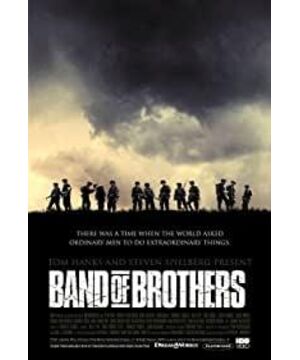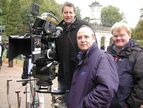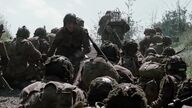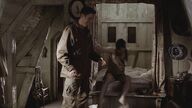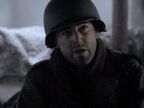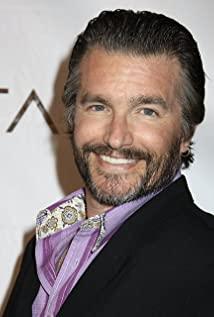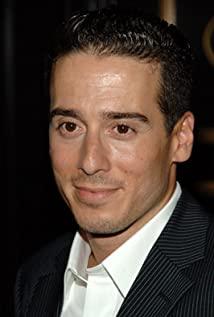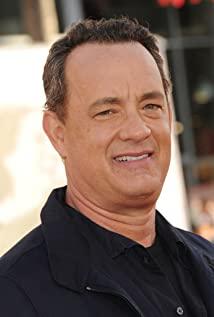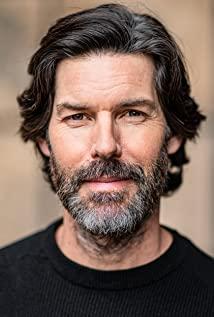The American soldiers of World War II made Camel cigarettes and ZIPPO lighters spread the world. The film reproduces the European battlefields of World War II. Familiar place names: NORMANDY, OMAHA, BOCAGE, SCHMERZEN...MG42 machine gun, TOOMPSON machine gun, M1 rifle, M4 Sherman tank , PZKPFW IV tank, PZKPFW VI-A Tiger tank, PZKPFW VI-B Tiger King tank, 88 mm anti-aircraft gun... a typical and exciting male TV movie.
From the perspective of the original work, the author Stephen EAmbrose started his creation based on the follow-up interviews with the existing personnel of the E Company of the 506th Regiment of the 101st Airborne Division.
The photography and plot basically continue the style and route of "Saving Private Ryan", looking at the war from the perspective of a paratrooper, so it should be regarded as Spielberg's series. As the producer of DreamWorks, he also strictly abides by Spielberg's war. law. As for Tom Hanks as the producer and the director of the fifth episode, there is no doubt that he will become a good director.
What is still fresh in my memory is the most tragic coast of Omaha in NORMANDY in "Saving Private Ryan".
The
first episode of Currathee's recruit training is the opening chapter. It is basically flat and interspersed with memories. The photography is basically based on the perspective of Ensign Winster. The Jewish lieutenant instructor Sauber was rigorously trained and tortured. In the first two years of the soldiers, Sauber was promoted to captain. , Winster was promoted to lieutenant.
At the beginning of the processing of drama art, Sauber became more and more rookie, road blindness, lack of leadership skills, crowding out Winster, making things difficult for soldiers, and collectively impeaching Sauber. As for Sauber's lost eyes and nostalgia, it is the highlight of this episode.
Spielberg’s war films often rarely appear contradictory, and the principle says three “whatever”s: all American soldiers are patriotic; all wars require reflection; all cruelty reflects the innocence of war individuals.
German Nazi soldiers are also cruelly dying, this is indisputable. This episode focuses on paving the way for the subsequent plot, looking at the war, and the ninth episode is the part where the answer and the climax are found.
The
second episode of Day of Days Normandy Landing Day officially took the audience into a brutal war.
The European-themed films of World War II are divided into two main camps, the former socialist camp led by the Soviet Union and the capitalist camp led by the United States. The second is the films of the defeated countries. Most of the films that positively reflect the army and praise the Nazi group were shot during the war, and most of them are now classified as low-selling things. I remember that Germany filmed the "Defense of Stalingrad" from the perspective of the German army. Cut in. Most of the films of the former defeated countries in the postwar period and the modern era portray the sufferings of the people from the side. This category includes Japanese "Looking Home" and Italian and Polish Jewish films. The Japanese nation’s understanding of war has always been a diehard, and the Tojo Hideki filmed by Toei in 2000 caused condemnation in Asia and the world.
There are also big differences in film expression, so we have formed a habit of thinking. Once we cross the gap, it will appear jerky and moldy. The Western-invested "Arrived at the City" is a good example. The handwriting of making history and demonizing Soviet officers is really offensive, and the background significance of the defense of Stalingrad has also weakened. The problem with Soviet films is the perspective of the balance, which blindly emphasizes the instrumental and political aspects of the film, and the human perspective is not understood well.
War films for commercial entertainment purposes are also Hollywood’s strengths. Zhang Guan and Li Dai are the source of the script. All the advanced elements of the Allied forces have made Americans localized. "U571" has made the British quite dissatisfied. As for playing against the background of war, there are countless examples, such as "The Bournemouth", "Lily Malin", "The English Patient", ethical "Classroom Love", "Forbidden Love", and even "Indiana "Jones" Harrison Ford also has a hand-to-hand fight with the Germans.
Spielberg’s "Schindler's List" and "Saving Private Ryan" are recognized by everyone because he basically grasps the third-party perspective of war and deliberately strengthens human beings. It should be said that the spirit of male body DIY is strong and cruel. The visual impact reflects on the war.
From the perspective of the U.S. military, the audience’s heart began to excite, and persistent voices began to ring through their ears, killing Germans and killing prisoners of war. Feel too much. Then, when the enemy's bayonet slowly pierced into the chest, the audience began to face the killing of prisoners coldly again. Such conflicting and complex emotions have always run through each period of time, so the impact is long, intense, and reflective. Compassion is the other side of human nature.
The
third episode of Carentan Carrington should be titled: Fear, or Overcoming Fear.
It is a long process to turn a purely kind person into a machine that dismembers the enemy in line with the meaning of war. On the other hand, it is a very simple process.
Give up hope and treat yourself as a dead person!
In this episode, the director decisively turned the camera into Bloy's independent perspective. Fear, cowardice, and serious rejection of war became the character of this character.
In contrast, a platoon leader, the machine that traded 20 CAMELs for the lives of 20 prisoners of war. The director still did not judge the color to record the real war.
The cruel strangulation is in progress.
Replacements recruits support
the hot welcoming scene in the Netherlands, women with bald heads and foreheads, Nazi symbols, and childish children. The bull's fight in the bullpen, the fear in the eyes of young women...This is war, which plunges women and children into danger and weak mud.
This episode director clearly demonstrated the cruel side of the description is also an excellent contrast War War theme for ordinary life, to take change of clothes section, not especially a sigh: "people one less!!"
Crossroads Crossroads
Wins Te's military rank is rising, and the method of inserting the narrative is exactly the same as in the first quarter!
The calm officer began to lose sight of the meaning of war on the streets of Paris, and began to find it difficult to follow the peace and tension of the war, and began to confess that the German children's eyes were on the path of the cold bullet.
The contradiction of human nature began to struggle, but once the soldiers returned to the battlefield, everything became so ordinary and ordinary again.
This episode is a French feast that Tom Hanks personally heads. It started to make male audiences excited and tasted some coldness.
The war should be like this! This episode of
Bastogne Bulge Combat
can be named Eugene's Love. The choice of the French nurse's headscarf is like war destroying and giving up love, and the friendship of comrades-in-arms is the power that surpasses everything.
The tragedy of Bastogne lies in its toughness and tenacity.
Shocking and sad emotions filled the whole emotion. Black person!
Finally met the black man, even though it was a Congolese nurse!
In "Saving Private Ryan", there were strong protests from black organizations. In the scene of the Omaha landing, it was all white people, which unilaterally denied the contribution of colored people to World War II.
Helplessly, this is basically Holawood's rules.
The Breaking Point Breakthrough
Huber's death is dramatic, the Ruger pistol.
Dyke witnessed the broken leg of his comrade, Lutz witnessed the death of Muk and Pankara.
The unexploded shells in the foxhole.
The contingency of war and the mood of war exhaustion.
I began to look for the immediate reasons for digesting the reasons for the war in my consciousness.
The Patrol patrol
continued from the previous episode. It portrays war exhaustion. After eliminating the so-called national interests, political needs and other reasons, the search for vital interests and the desire to survive in war.
The comparison between the ego and the ego has become an unnecessary burden.
Why We Fight
I have seen netizens comment on the redundancy of the section on concentration camps. In my opinion, this is simply entertaining the director's intention, and the meaning of the play does not exist. It is ridiculous to measure the objective existence of this episode with the naive views born in the late 1980s.
The persecution of non-German nations such as Jews by the Nazis during World War II was why the nightmare was cut off.
This set of calculations gives a clear evaluation of the justice of the Allied forces in World War II, and also provides a reasonable tremor for the soldiers with high anti-war sentiment.
The call for justice began to resound in the hearts of every audience.
Points Vanguard
points.
For the liquidation of war criminals, the sentiment of revenge for the Jewish nation.
The speech for the German generals to accept the surrender is over. The speech is used to summarize the battle for the motherland, and the speech is used to emphasize the brothers in comrades in arms.
Hartfield Airport outside London was used to build the entire European battlefield. After eight months of intense shooting, eight directors almost perfectly fit a theme. With DV, subjective lens, image vibration, and first angle of view, the Second World War was fully resurrected.
It's not an exaggeration to describe it as a documentary epic chapter.
The final two words: peace! (Text/Changyou Fourth Hospital)
View more about Band of Brothers reviews


